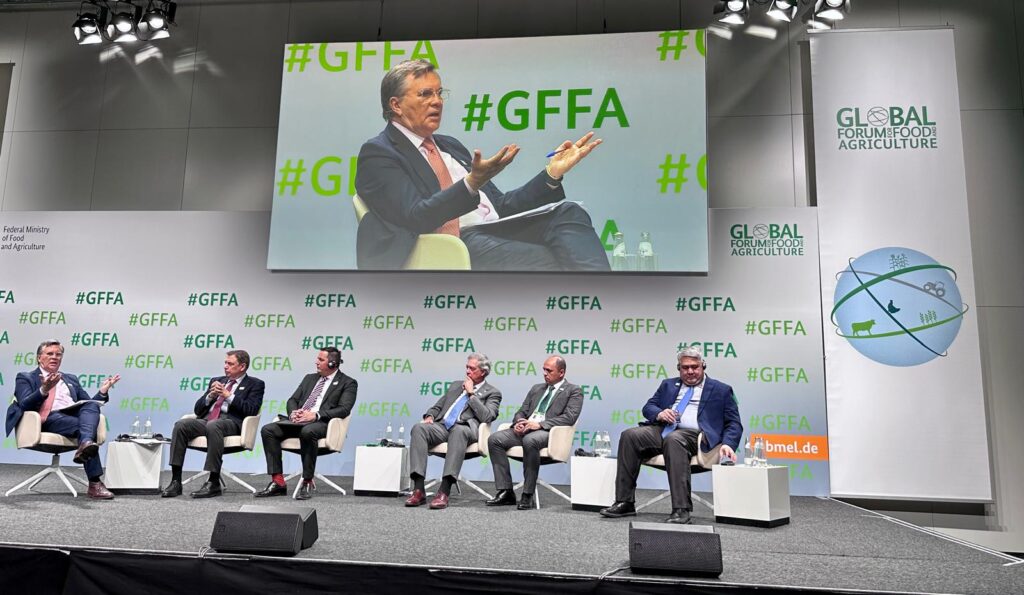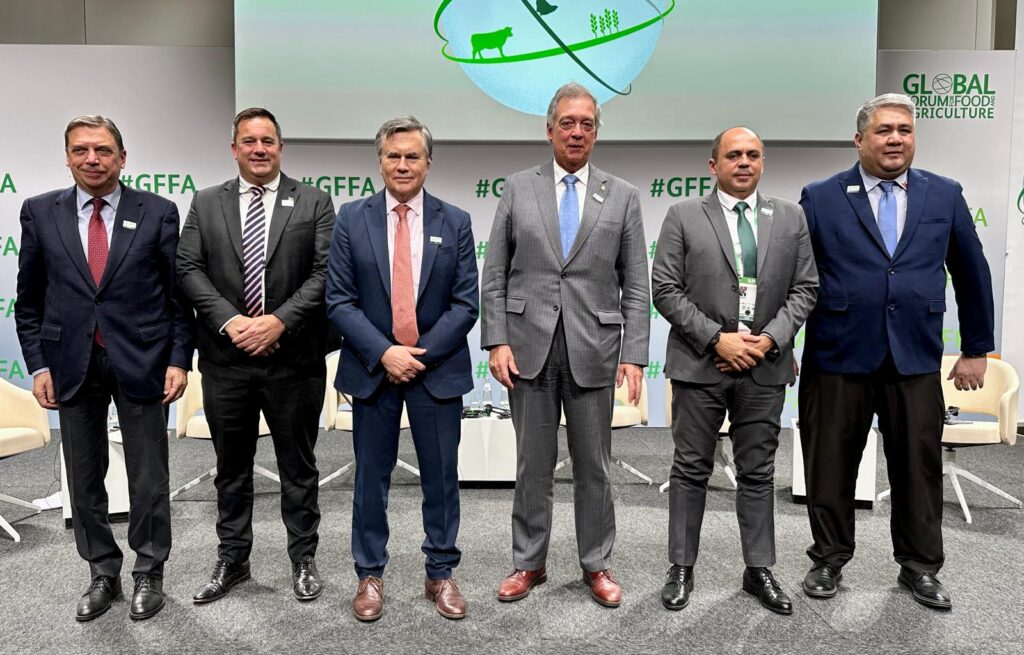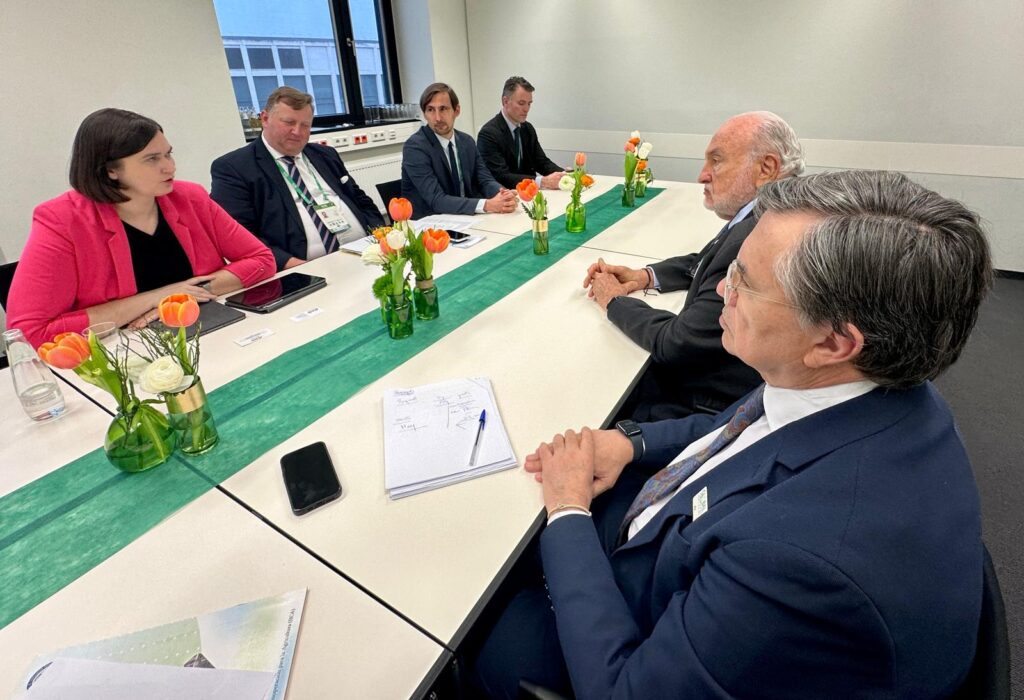
IICA Director General, Manuel Otero moderated a panel discussion in which ministers of different continents shared their countries’ experiences and explored similarities and differences.
Berlin, 20 January 2025 (IICA) – Ministers of Agriculture of more than sixty-three countries and high-level representatives from fourteen international organizations, at a meeting in Berlin, which also featured the participation of the Inter-American Institute for Cooperation on Agriculture (IICA), agreed to drive the bioeconomy as a critical instrument for the planet’s economic, social and ecological development.
The Global Forum for Food and Agriculture (GFFA), organized by the German Government, also demonstrated the strongest political commitment of the governments to the objectives of the Paris Agreement on Climate Change and the Convention on Biological Diversity (CBD).
At the same time, the ministers and international organization representatives in attendance stressed that there is no one production model and that the shift towards greater sustainability in countries’ agrifood systems should be enhanced, but always respecting regional and local conditions and characteristics.
The final document of the meeting—which was chaired by the Minister of Agriculture and Food of Germany, Cem Özdemir—noted that a sustainable bioeconomy is key to transforming the global economy in line with the Sustainable Development Goals (SDGs), with agriculture playing a decisive role as a supplier of biological resources.
IICA Director General, Manuel Otero, in his second consecutive appearance at the Berlin forum, moderated a panel discussion in which ministers of different continents shared their countries’ experiences, explored similarities and differences and discussed how to strengthen global collaboration to achieve a sustainable agricultural bioeconomy.
Other participants included Fernando Mattos, Minister of Livestock, Agriculture and Food of Uruguay; Luis Planas, Minister of Agriculture, Fisheries and Food of Spain; John Steenhuisen, Minister of Agriculture of South Africa; Pedro Neto, Secretary of Innovation, Sustainable Development, Irrigation and Cooperativism at the Ministry of Agriculture and Livestock of Brazil and Christopher Morales, Undersecretary of the Department of Agriculture of the Philippines.
“We need more action; we must strengthen global collaboration to achieve a sustainable bioeconomy in agriculture”, said Otero, stressing the need to rethink agriculture, preserving its positive aspects, and bearing in mind that one of the tasks is to build bridges to connect consumers and producers, who are becoming more disconnected each day.
“The bioeconomy is a much-discussed topic in today’s world. These words must be transformed into more actions to improve our people’s standard of living. We must work and think how to best make use of the biomass generated by agriculture and livestock production, and by the fishing and forestry industries. We must also recognize that the bioeconomy is not the same for everyone: we must respect our different production chains, our history and our culture. There is not one-size-fits-all recipe”, Otero added.
The IICA Director General attended the forum, accompanied by the Special Advisor to the General Directorate, Jorge Werthein, and the Manager of the Innovation and Bioeconomy hemispheric program, Hugo Chavarría.

Luis Planas, Minister of Agriculture, Fisheries and Food of Spain; John Steenhuisen, Minister of Agriculture of South Africa; Manuel Otero, Director General of IICA; Fernando Mattos, Minister of Livestock, Agriculture and Food of Uruguay; Pedro Neto, Secretary of Innovation, Sustainable Development, Irrigation and Cooperativism at the Ministry of Agriculture and Livestock of Brazil and Christopher Morales, Undersecretary of the Department of Agriculture of the Philippines.
Mattos, the sitting chair of the Inter-American Board of Agriculture (IABA – IICA’s highest governing body), noted that when we speak of the bioeconomy we are speaking about sustainability. “Uruguay is a prime example of this”, he said. “We are an agricultural country with a focus on the export market, given that our domestic market is small, and we know that if we do not safeguard our natural resources, we will have no future”.
Pedro Neto, representing the Brazilian Government, remarked that the bioeconomy is central to sustainable agricultural development and the inclusion of poor, rural and indigenous communities in a production context that respects the environment.
Neto described IICA as a fundamental partner of Brazil, not only for its work in shared strategic projects, but also for its leadership in regional and international discussions and its role in fostering agricultural research and innovation.
The Spanish minister, Luis Planas, explained that that the bioeconomy is part of a reality that is fundamental for food production. He acknowledged the fact that, “We each use the term ‘bioeconomy’ to refer to different things. The common denominator is the aspect of circularity and the use of not only the main products that we produce, but everything else, such as the residue from animal production or recycled water for production”.
Planas highlighted the relationship between Spain’s Ministry of Agriculture and IICA, reflecting on the photographic exhibition, “Leaders of Rurality of the Americas: Custodians of Food Security and Biodiversity”, which IICA mounted at the GFFA in Berlin.
On the other hand, the South African minister, described the Forum as an opportunity to demonstrate the similarities and differences between the countries, and also called for the strengthening of the bioeconomy agenda, in response to environmental and developmental challenges.
Steenhuisen also commended the photographic exhibit on Leaders of Rurality of the Americas. He noted that, “Everyone needs a doctor or lawyer at some point, but we need farmers three times a day, every day, to ensure that we have food. IICA’s photo exhibit reflects the passion of farmers”.

While in Berlin, Otero also met with the Parliamentary State Secretary in Germany’s Ministry of Agriculture and Food, Claudia Müller, discussing topics on the common agricultural agenda of Latin America and Europe.
Sustainable biomass
The Director General also moderated a debate between various countries on sustainable biomass production. The discussion brought to light the differences between the potential of various regions, as well as cultural and historic distinctiveness. The exchange allowed the participants to begin to define sustainable production in each place, and also how to measure and implement it.
While in Berlin, Otero and Werthein also met with the Parliamentary State Secretary in Germany’s Ministry of Agriculture and Food, Claudia Müller, discussing topics on the common agricultural agenda of Latin America and Europe.
More information:
Institutional Communication Division.
comunicacion.institucional@iica.int











